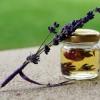CYBERMED LIFE - ORGANIC & NATURAL LIVING
CYBERMED LIFE - ORGANIC & NATURAL LIVING
 Aromatherapy uses plant materials and aromatic plant oils, including essential oils, and other aroma compounds for improving psychological or physical well-being.
Aromatherapy uses plant materials and aromatic plant oils, including essential oils, and other aroma compounds for improving psychological or physical well-being.
It can be offered as a complementary therapy or as a form of alternative medicine. Complementary therapy can be offered alongside standard treatment, with alternative medicine offered instead of conventional, evidence-based treatments.
Aromatherapists, who specialize in the practice of aromatherapy, utilize blends of therapeutic essential oils that can be issued through topical application, massage, inhalation or water immersion to stimulate a desired response.
There is no good medical evidence that aromatherapy can either prevent or cure any disease, but it might help improve general well-being.